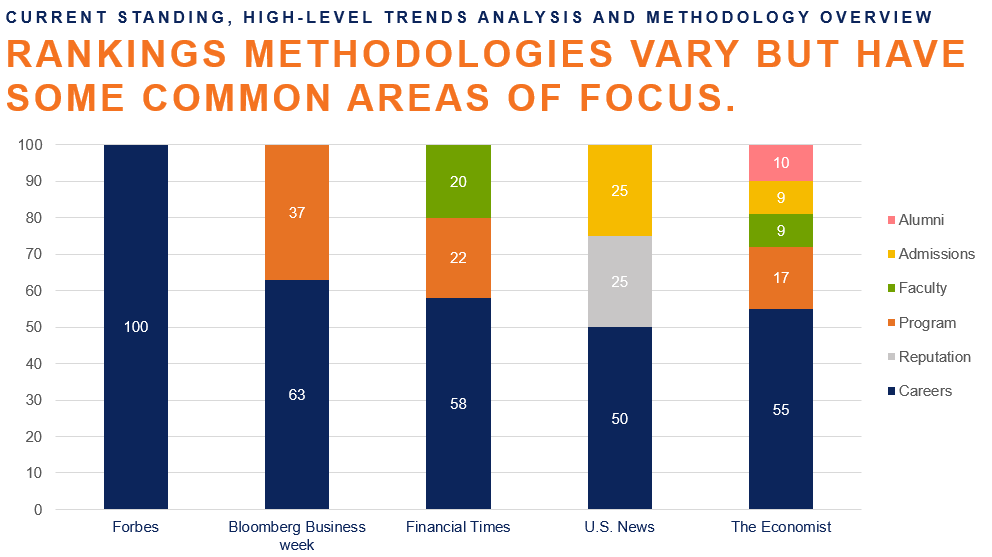Today’s post is authored by Senior Executive Director for Global Affairs and Enterprise Initiatives Marc Johnson (EMBA ’13).
A proud Darden alumnus, Johnson is responsible for guiding and advocating for Darden’s global strategy, initiatives and engagement, working alongside leaders across Darden to extend the School’s impact and reach around the world.
Understanding business school rankings can be tricky. Almost all prospective students consider them, yet no two ranking publications use the same methodology or come to the same conclusions. Ranked as high as No. 5, Darden appears in the Top 20 of U.S. schools in the five major rankings publications: Bloomberg Businessweek, The Economist, Financial Times, Forbes and U.S. News & World Report.
While rankings can help you narrow your selection of schools from the 16,000 institutions worldwide granting business degrees, it’s important to dig into each ranking to understand what they are telling you. As the rankings publications acknowledge, there are often very small differences between schools’ scores, especially those in the top bands of a ranking.
Some rankings use objective (quantitative) data, others use subjective (qualitative) data, and some use a combination of both. At a high level, the rankings are measuring some combination of career outcomes and ROI, employer ratings, selectivity in admissions, diversity of the community, student experience, faculty quality and ratings by other business schools.

Here are some of the main criteria that the five major ranking publications evaluate within these different areas:
- Forbes: Evaluates return on investment on the MBA using salaries of alumni who are five years out minus salaries lost while in school and the cost of education. The ranking is released biennially.
- Bloomberg Businessweek: Rates qualitative student experiences, career outcomes and gives significant weight to recruiters’ feedback.
- Financial Times: Analyzes career outcomes, including salary increases for alumni; student, faculty and board diversity; depth of international opportunities; and faculty publications in peer-reviewed journals.
- U.S. News & World Report: Considers ratings from business school deans and administrators and MBA recruiters as well as data on class profile (GMAT, GPA and class diversity) and career outcomes.
- The Economist: Evaluates education experience based on student surveys, career services and outcomes, recruiter diversity, faculty and student quality and diversity, and alumni network effectiveness.
Darden tends to do well in surveys that measure student and alumni experience and satisfaction, salary outcomes and ROI.
We make a strategic choice to focus on teaching excellence, student satisfaction and purpose-driven leadership, and that orientation is often reflected in the rankings. That’s one reason The Economist has named Darden the No. 1 education experience in the United States for nine straight years.
The specialist rankings can also tell you key data about a school. Many of these are released to focus on a specific quality of the school, rather than an overall ranking. For instance, a sampling of recent Darden rankings have included:
- No. 1 Education Experience (The Economist, 2011–18 globally; 2019 U.S.)
- No. 1 Satisfaction With MBA Education (Forbes, 2017–18)
- No. 1 MBA for Corporate Social Responsibility (Financial Times, 2019)
- No. 1 Best Campus Environment (The Princeton Review, 2017)
- No. 1 MBA for General Management (Financial Times, 2013–17, 2019)
- No. 1 Best Professors (The Princeton Review, 2017-19; The Economist 2017-19)
- No. 1 Overseas Study (The Economist, 2014–19)
- No. 2: Learning (Bloomberg Businessweek, 2019)
- No. 3 Starting Salary at Graduation (U.S. News & World Report, 2019)
- Top 3: Student Rating of MBA Program (The Economist, 2013-19)
- Top 3: Best MBA for Consulting (The Princeton Review, 2017-19)
Once you have narrowed down the list of schools in which you are interested, explore the schools’ cultures, as they are vastly different ― even in the Top 20. Because the difference in rankings among the Top 20 are often razor-thin, it’s important to use the rankings as a guidepost to what is important to you and then dig deeper. Focus on finding the right experience for you.
- Research the program and overall student experience.
- Talk with current students and alumni who have firsthand knowledge of a school and its environment.
- Visit the campus
- Sit in on a class.
In other words, get on the ground. Kick the tires. Learn the culture. Consider a school from all angles and decide on what is most important to your MBA journey. Rankings may be helpful as you start exploring, but there is no substitute for your own judgement.
We’re confident you will find the graduate business school that’s right for you. And we hope you will visit Darden on your journey of discovery.
Check out faculty thought leadership published on Ideas to Action. And stay connected with us via social media: Facebook, Instagram, LinkedIn, Twitter, WeChat





